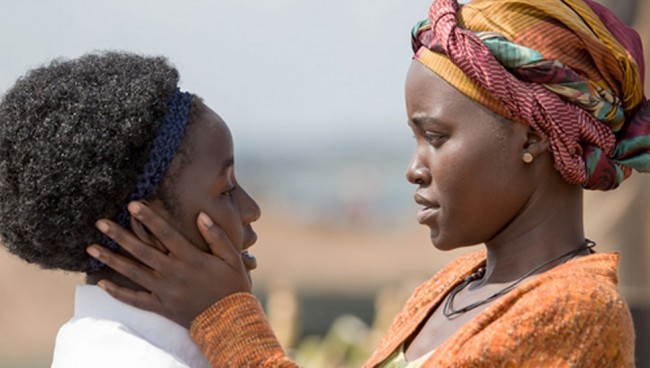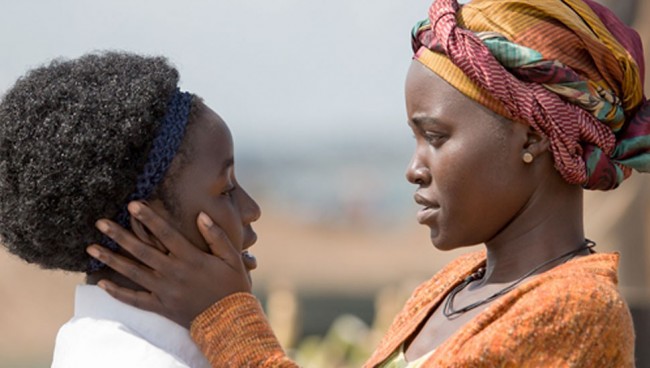By Subhash K. Jha
Film: “Queen Of Katwe”; Director: Mira Nair; Cast: Lupita Nyong’o, Madina Nalwanga, David Oyelowo; Rating: ****1/2 (four and a half stars)
There she is, the maize-selling girl from the slums of Africa who becomes a chess champ, thanks to the indefatigable encouragement and support of her upright coach.
We’ve seen this story in countless motivational films including the recent grossly underrated “Budhia Singh — Born To Run”. Well, if little Budhia could run the marathon, wise and thoughtful Phiona is no less wedded to her own gamely bliss. Chess, as it happens to be. Her story is told here with a crackling transparency and a disarming sincerity verging on didacticism.
The poetry, if you will, pores out of the prosaic. The desperate rhythms of poverty are almost identical in every culture. “Queen Of Katwe” could be a story waiting to be told from the slum of Dharavi. No matter what the definition of poverty and squalor in any culture, the boxes that a filmmaker ticks in film about rising from the ashes are identical. There has to be a ferociously gifted and suitably endearing prodigy waiting to be discovered by a talent curator with an eye so keen he can cut through the currency of commonplaceness and peer into the prodigious aptitude of the genius.
The trick of a successful talent-discovery is to make the audience an integral part of the rites of pursual as he or she goes from destined weakness to wangled power strength and glory. While little Madina Nalwanga is remarkably successful in showing wistful longing, she fumbles when later she must flaunt an awkward arrogance. The coach goes a long way in balancing out the unevenness of the central performance in the later, far less satisfying portions of the narrative.
The flaws are so trivial when weighed against the film’s tremendous humanism. Mira Nair’s commendably conceived enchantingly executed sports saga scores supreme marks in its strides from documentary to fable. This is a film so steeped in the glow of expectant glory that we the audience cannot resist being swept into the tidal waves of Phiona’s meteoric rise from maize to…amaze.
It is comparatively easier to swig a spin into a sports film that’s set in the outdoors. A Milkha sprinting in the stadium or a Dhoni batting on field is a winner on the visual level. But a film about a chess prodigy is on paper a stifling undertaking, specially when the director rejects the option of puffed-up drama and high-strung background score to make the indoor sport seem sexy. Mira Nair keeps the drama reined in. The dialogues frequently sound like fortune cookie. But really yummy ones.
Sexiness is not to be obtained in the lives that the characters lead. It’s in the way they take charge of their lives and make sure they remain dignified even while being dragged down to the mud by destiny. It is in fleeting moments of deceptive casualness that Mira captures the full impact of Phiona’s wretched living conditions.
When Phiona tells her coach she doesn’t want to return to her mother, as soon men would start trying to pick her up the way they did her elder sister, you will hear a shattering sound that is not the background music. It is your heart breaking. The first time when Phiona drops in to play chess at her coach’s sporty shack, she hungrily licks the porridge from the outer brims of her cup. Food, though in short supply, is never shown as a bargaining point for generating pathos and drama.
The characters rise, with magnificent dignity, above their poverty.
While Madina Nalwanga and the other chess playing children are absolute naturals (watch out for Ethan Nazario Lubega as Phiona’s brother who often steals scenes from his star sister), the film’s dynamics flow from the two adult performances, the luminous Lupita Nyong’o and David Oyelowo who as Phiona’s mother and chess coach impart an eternal sunshine into the grim predicament of those who cling to the poverty line hoping to remain afloat even when they are kicked repeatedly in their backside by their destiny.
While the chess games are played out with an infectious nervous anxiety, it’s Phiona’s relationship with her mother and coach that nail down her life story to the lamp post of humanism.While Lupita is deeply dignified in her desperate poverty (watch her wriggle out of a not-so-subtle propositioning by an old flame at time when she desperately needs money). She plays Phiona’s mother as a woman undefeated by the what destiny has allotted her.
I must confess I have not seen David Oyelowo’s work before.His projection of unwavering idealism is so enticing it reminded me of Sidney Pottier in “To Sir With Love”.
Interestingly “Queen Of Katwe” has only Black African characters. I couldn’t help thinking about Tannishtha Chatterjee’s recent outrage at being ridiculed on a comedy show for her dark skin. The people who live in Mira Nair’s film are dark-skinned but so illuminated by a wisdom that only comes from deprivation and poverty that we see only their hope and positivity.
This is a film that wears its heart proudly on its sleeve. Shot in glorious splashy colours and rustling up an African soundtrack that makes our hearts twirl and gambol, it sweeps you in its inspirational universe with such earnest intentions, you wouldn’t want to say no to even its most manipulative moments when poverty almost becomes a pivotal character in the plot challenging the protagonists for a combat to the finish.
You know how its ends. But the struggle never ceases to enthrall.
Sometimes, says the wise coach to Phiona, the place where you are is not where you are meant to be. This movie located in the heart of fledgling dreams is one place you must be this weekend .






